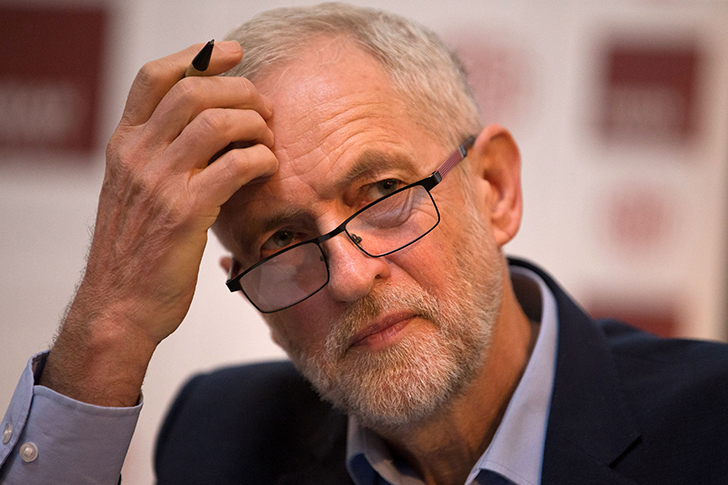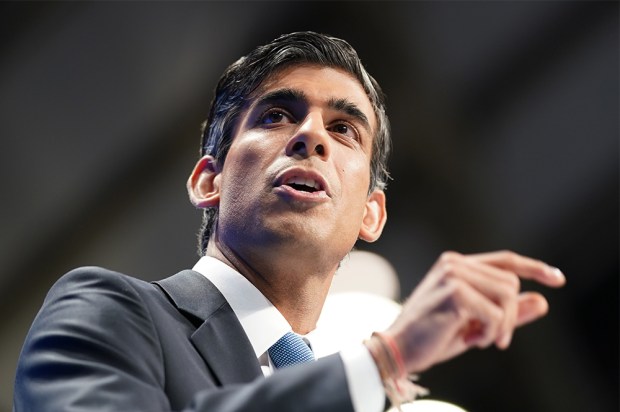Just as it seems that Labour has reached the bottom of the abyss, Jeremy Corbyn and his party somehow manage to find a new low. The latest nationwide poll puts them at 24 per cent, trailing the Tories by 16 points. No wonder Labour MPs look so boot-faced around Parliament, and an increasing number are hunting for jobs elsewhere. If a general election were called now, the Conservatives would win a huge majority. Labour would be further than ever from power, arguably even finished as a major parliamentary force.
Polls are not rock-solid indicators of future electoral success or failure, but Labour’s ratings are so abysmal as to suggest a party facing an existential crisis. Labour’s support in Scotland is now as low as 14 per cent, which may lead to another humiliation in the coming council elections. Corbyn’s approval ratings are extraordinarily bad. Any which way you cut the demographic — old and young, Leave and Remain, northern and southern, male and female, those who voted Labour at the last election and those who didn’t — Labour’s leader has a net negative rating, usually a big one. The polling company YouGov has found that for the first time in the party’s history, Labour ranks behind Ukip and the Conservatives among lower-income voters — this in spite of Ukip’s increasingly shambolic performance. Corbyn could fall lower still — no-one has attacked him in any significant way for his support of Hamas, the IRA or the disastrous experiment in socialism that is Venezuela (see p. 14).
For all his faults, however, Corbyn is a symptom rather than the cause of this malaise. Deeper shifts in politics are tearing Labour apart. The party is bitterly divided over Brexit. Seven out of every ten Labour constituencies, particularly those in the north of England, voted to leave the European Union. Meanwhile the party’s more metropolitan seats — in Cambridge, Norwich and London, for example — voted to remain. Labour voters in the former camp are fed up with mass immigration. Those in the latter keenly support the free movement of people in Europe. Any Labour leader, even one much more skilled than Corbyn, would find it difficult to bridge this ideological gap. Indeed, it was in some ways a triumph for Corbyn that, after he ordered a three-line whip, only about 50 of his MPs rebelled in the vote on triggering Article 50 last week. The Tories, by contrast, for the first time in decades, are relatively united over Europe.
Next Thursday’s by-elections in Stoke-on-Trent Central and Copeland, Cumbria, are vitally important for Corbyn — and yet in Stoke, the Labour candidate, Gareth Snell, is a Remainer who has had to apologise for having sent abusive and misogynistic tweets. Not the best candidate to field against Ukip’s leader Paul Nuttall. In Copeland, where a major employer is the nearby Sellafield nuclear plant, Labour’s prospects are hampered by Jeremy Corbyn’s anti-nuclear stance. Both contests are taking place because the incumbent Labour MPs quit Parliament, imagining their prospects would be brighter outside politics. This has not endeared the Labour party to the voters of Stoke and Copeland. No wonder both Ukip and the Tories scent victory.
Even if Labour does scrape through next week, the party’s troubles are far from over. Nor would Jeremy Corbyn’s departure solve the problem. Since both Blairite and Brownite factions within Labour have shown that they cannot remove him, it falls to the far left to come up with an answer to its own failure. Labour’s most realistic hope now is to find a more appealing version of Corbyn, but there just isn’t such a person. The fact that obscure MPs like Rebecca Long-Bailey and Angela Rayner are now mooted as possible successors to Corbyn only highlights the party’s plight. John McDonnell is said to be on manoeuvres, but he is weighed down by the same baggage as the current leader.
Brexit, once it happens, will only intensify Labour’s agony. Leaving the EU will bring domestic issues surrounding globalisation and immigration to the fore, and over these the two blocs of Labour’s electoral coalition are on different sides. If the price of free-trade deals with countries outside the EU is to grant more visas to them, we can expect metropolitan Labour to cheer and northern Labour to protest.
Yet despite Ukip’s growing strength in the north, the SNP’s control of Scotland in Parliament and a Tory party united under Theresa May, it is not as if there is a single force that can obviously replace Labour as the opposition. It is a political bed-blocker: too weak to succeed, too strong to die. This might seem like good news for the Conservatives. It is not. They are prone to complacency without an effective opposition. Labour’s troubles do the nation no good.
Got something to add? Join the discussion and comment below.
Get 10 issues for just $10
Subscribe to The Spectator Australia today for the next 10 magazine issues, plus full online access, for just $10.














Comments
Don't miss out
Join the conversation with other Spectator Australia readers. Subscribe to leave a comment.
SUBSCRIBEAlready a subscriber? Log in